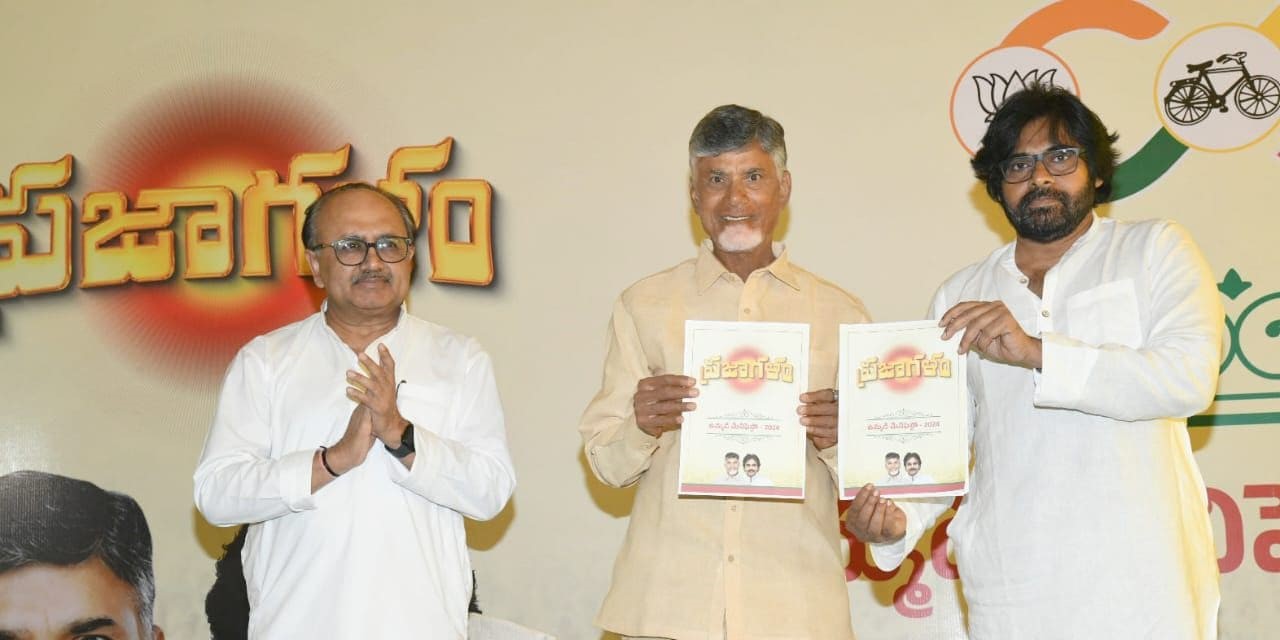TDP and JSP, upon releasing their joint manifesto, also stated that it had the endorsement of their national ally: BJP.

TDP chief Chandrababu Naidu and Jana Sena chief Pawan Kalyan at the manifesto release. (Screengrab)
The TDP-JSP alliance, in partnership with BJP, released on Tuesday, 30 April, its full-pledged manifesto for Andhra Pradesh, where simultaneous Lok Sabha and Assembly elections are scheduled for 13 May.
In addition to the “Super Six” manifesto announced by TDP last year, another set of six promises — called the “Shanmukha Strategy” — was proposed by Jana Sena Party.
This combined manifesto was released at the residence of TDP chief Chandrababu Naidu in Undavalli, with Jana Sena chief Pawan Kalyan and BJP’s Andhra Pradesh in-charge Sidharth Nath Singh in attendance.
In response to the absence of BJP branding on the manifesto announcement, Naidu stated, “The NDA has released a national-level manifesto and is not associating it with any state-level manifestos. However, it has offered support and endorsement. Jana Sena and TDP take responsibility for implementing the manifesto.”
The construction of the “public” capital Amaravati, the protection of “Hindu” property, three free gas cylinders per household per year, ₹4,000 pensions, and free bus travel for women were among the highlights of the joint manifesto.
It also promised “quality” liquor at lower prices in the state, emphasising the “control of liquor prices” and the “abolition of toxic liquor brands”. Additionally, it promised to re-establish the Anna Canteens for the poor if the parties were voted into power.
The key highest of the manifesto are:
TDP’s ‘Super Six’
JSP’s ‘Shanmukha Strategy’
Youth welfare
Reiterating the promises from the Backward Classes’ (BCs’) declaration, the TDP-JSP chiefs said they were committed to providing a ₹4,000 per month pension for BCs over 50 years of age, enacting a special act for the protection of BCs, and spending ₹1.5 lakh crore over five years through a BC sub-plan.
Regarding women’s welfare, Chandrababu Naidu stated that loans would be available through the “Kalalaku Rekkalu” (Wings to Dreams) scheme.
He noted that the limit for interest-free loans to self-help societies would increase from ₹3 lakh to ₹10 lakh.
“Anganwadi workers will be entitled to gratuity according to a Supreme Court decision, and steps will be taken to increase the minimum wage for Asha workers. Provision for hostel accommodation for working women,” he added.
Naidu further announced that the Land Titling Act would be repealed to protect people’s property. He accused Jagan Mohan Reddy of implementing the act to seize the lands of the poor and promised to repeal the current bill.
The manifesto to government employees included better implementation of the Pay Revision Commission (PRC) with a review of allowance payments. Salaries and pensions would be disbursed on the 1st of every month, with arrangements to clear pending arrears.
The formation of a Pensioners Corporation, abolition of low-wage outsourcing, contracting, and consolidated jobs, and an increase in the honorarium for volunteers from ₹5,000 to ₹10,000 were also outlined.
Additionally, government schemes would be made applicable to employees, promised the manifesto.
For the welfare of Scheduled Castes (SCs) and Scheduled Tribes (STs), the manifesto promised a pension at 50 years of age. It also mentioned that sub-plan funds would be allocated for their development.
The renovation of GO 3, the appointment of Adivasi teachers in agency areas, and the filling of backlog posts for both communities were additional commitments.
The joint manifesto included several promises for various upper-caste communities as well.
For the Arya Vaishya community, it proposed facilitating interest-free loans for small traders, implementing strong measures to promote business in a free environment, and officially recognising the offering day of Goddess Kanyakaparameshwari as a government festival.
For Kshatriya welfare, the manifesto recommended renaming Bhogapuram Airport as Alluri Sitarama Raju Airport and allocating 5 acres of land for the construction of an Alluri Sitarama Raju Memorial in Amaravati.
It also committed to providing funds to forward caste communities such as Kamma, Reddy, Velama, and other upper caste corporations to promote their empowerment and growth.
Further, the Brahmin community is promised the establishment of a “Hindu Endowment Board” to oversee the preservation of Hindu temples and religious centres.
The minimum salary for priests in temples with annual incomes over ₹50,000 is also promised to increase to ₹15,000, while for those with incomes below that threshold, the allocation for incense, lamps, and offerings will be increased from ₹5,000 to ₹10,000.
The manifesto also ensures complete independence for temples in matters related to “Vedic and Agama Shastras”.
Furthermore, the “Yuva Galam” programme would offer a ₹3,000 monthly unemployment benefit to those who have studied Vedic education but remain unemployed.
(Edited by Arkadev Ghoshal)

May 17, 2024

May 16, 2024

May 16, 2024

May 16, 2024

May 16, 2024

May 16, 2024